Planting herbs in China's 'water tower': Alleviating poverty the ecological way
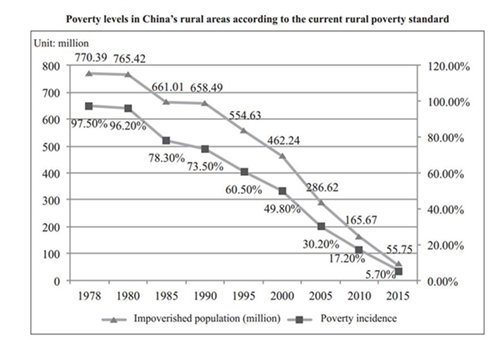
Graphics shows the poverty levels in China's rural areas according to the current rural poverty standard, Oct 17, 2016. (Photo: Xinhua)
By 2020, China aims to eradicate poverty to build a moderately prosperous society. However, among the people who have still been left behind, a considerable number live in remote areas and are in deep poverty. This makes poverty reduction efforts very difficult.
Qumalai, is such a deeply impoverished county, located in the north of Yushu Tibetan Autonomous Prefecture of China's northwest Qinghai Province. It is a pure pastoral highland in the Qinghai-Tibet Plateau, mainly inhabited by Tibetans.

Photo: A brook in Qumalai county stretches into the distance. (Photo via People's Daily app)
Its average altitude is more than 4,000 meters, with a typical plateau cold climate characterized by coldness and anoxia, lengthy exposure to sunshine and strong ultraviolet radiation. The annual temperature difference is small, but the daily temperature difference is large.
The harsh climate and geographical conditions have caused the county to be deeply impoverished. Among its 45,718 population, 11,328 people from 3365 households are registered as poor, said Li Jian, deputy secretary of the Qumalai County Party Committee.
Li said that a lack of industries has been the bottleneck for local development. "The largest industry, cattle and sheep, is facing limited grazing because of the degradation of grassland," Li lamented. "We must build two or three more industries as a matter of urgency, which can protect the ecological environment and increase people's income."

Photo: Students in a local school for orphans pose for photos in front of an off-road vehicle. (Photo via People's Daily app)
Ecology is the first priority
To lift people out of poverty, normally it would be a common tactic to build up industries which can create jobs. However, creating industries in Qumalai requires caution.
As the core area where Asia's three greatest rivers - the Yellow River (mother river of China), Yangtze River (the world's third largest river) and the Langcang River (also known as Mekong River and the longest river in Southeast Asia), start their long journey of life, Qumalai bears great ecological significance which can never be overemphasized.
Each year, the source area of the three rivers supplies about 6 billion cubic meters of water downstream. It is therefore called the "China Water Tower." It is also the most concentrated area of plateau biodiversity, home of the Tibetan antelope, wild yaks, Tibetan wild donkeys, brown bears, snow leopards, wolves, hawks and larks.

Photo: Water flows in the Three-River-Source region./ Credit to Three-River-Source National Park website. (Photo via People's Daily app)
Water is the blood of the earth and the rise and development of all civilizations on this blue planet depends on water. Qumalai's special geographical location, abundant natural resources and important ecological functions make it an important ecological filter not only for China, but also for Asia and the world.
In 2016, Chinese President Xi Jinping emphasized that Qinghai must shoulder the great responsibility of protecting the source of the Three Rivers and the "China Water Tower." He stressed that Qinghai's greatest value is in its ecology, its greatest responsibility is in its ecology, and its greatest potential is in its ecology.
2016 was also the year that the Three-River-Source National Park started trial operations in an attempt to protect the ecology in the region. In 2020, the park will officially open, becoming China's first national park.
With the ecology being the first priority, the exploitation of mineral resources is prohibited, though there are gold deposits which could easily make the local people prosperous, said Li. In addition, raising livestock cannot be expanded in a disorderly way. "Even building infrastructure needs caution."
Linking ecology and development
So what can help herdsmen cast off poverty in a place where generations of nomadism led to a decentralized population distribution, scattered investment in infrastructure construction, a weak ability of urban centers to absorb rural people and strong restrictions on setting up industries?
Wang Enguang, deputy director-general of the Qinghai Forestry and Grassland Bureau, said Qinghai Province has created jobs as grassland ecological guardians for 49,000 registered poor people. About 17,000 of them are from the Three-River-Source region. Each of them can receive 1,800 yuan ($260) per month.
These posts can help lift the local people out of extreme poverty. In addition, herdsmen can also protect the grass, trees and mountains in their hometown, said Wang.
At the county-level, Li said Qumalai has set up more than 60 ecological animal husbandry cooperatives, which optimize resources and transform the traditionally extensive and inefficient animal husbandry industry into operating in a more intensive and efficient way.
Most importantly, these cooperatives can largely operate with less labor, enabling young herdsmen to accept vocational education and skills training, including haircutting, cooking, automobile and motorcycle repair, sewing and financial management of cooperatives.
Cheng Lin is such a beneficiary at the government-initiated skills training center. From an illiterate grassland girl to a chef in a Qumalai county government canteen, from a poor family living in distress to an employee with a fixed salary of 5,000 yuan ($711)per month, Cheng herself had never imagined such a transformation could ever occur to her.
Qumalai is largely a pastoral area which offers limited job opportunities. Li said the entrenched pastoral culture makes local residents lack an urge to compete. "Though they have skills, they are not used to going out to compete for better job opportunities."
As a local governor, Li is not worried about falling short of the goal of eradicating poverty by 2020, as the national poverty line of $436 can merely feed and clothe people. He is more concerned about how these people can go beyond this goal to be prosperous in a sustainable way.
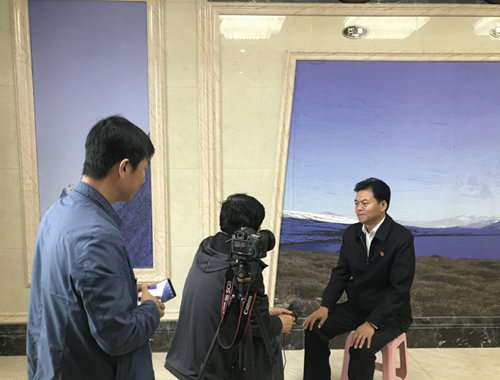
Photo: Li Jian answers questions during an interview./Credit to Wang Huijun (Photo via People's Daily app)
One of the problems with the poverty reduction situation in Qumalai and Qinghai Province, as both Li and Wang pointed out, lies in the fact that the some of the poverty reduction efforts still resemble a temporary solution, with little economic sustainability, even though the ecological and social benefits are significant.
Not too high for planting
So is there a way develop the economy, give social benefits to the local people and protect the environment? In Li's eyes, a solution lies in Maduo township, where some six hours' trek through bumpy roads, mountains and rivers can reach from the county downtown. He sees potential in a large Chinese herbal plantation there.
Because of the climate, rodent infestation and historical overgrazing, the desertification of the land is particularly serious, with nearly 60 percent of the grasslands desertified. Without good grazing grassland, nearly 70 percent of the herdsmen in the whole township moved to Golmud and other places, added Tuju.
But this started to change two years ago when Zhengletang Biotechnology Group came and set up its subsidiary Qumalai Zhengbaicao Traditional Chinese Medicine Planting Co Ltd, which plants isatis root and sophora flavescens root on about 3,333 hectares of uncultivated land.
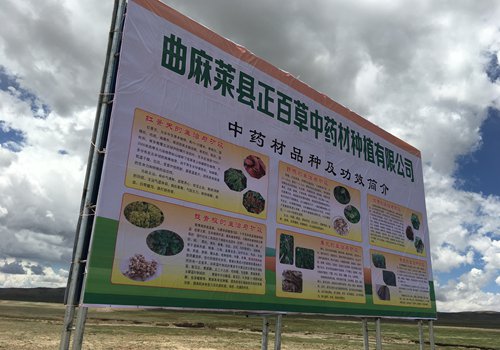
Photo: The billboard indicates what medical functions the planted herbs have.(Photo via People's Daily app)
As the pioneer of alpine herbal plantations, Zhengbaicao faces enormous challenges. In addition to the lack of infrastructure, raising herbs in cold areas with an average altitude of 4,500 meters is by no means an easy task. The first thing the company needed to figure out was the feasibility of its plan.
After more than two years, the first experimental batch of plants has been successful. Li said that the old idea that Qumulai was too high for planting had been disproven.
In fact, Maduo township's high altitude has proven to be an advantage for herbal plantations as it offers a large area of available uncultivated land, and excellent water quality and soil. Herbs grown here will be pollution-free.
From 'blood transfusion' to 'hematopoiesis'
So far, the planting base has rented nearly 6,667 hectares of land in Maduo township, involving 14 herdsmen, and the annual income from the land transfer alone exceeds 2 million yuan ($285,000).
In the words of Wang Lige, general manager of Zhengletang, the herbal plantations not only bring job opportunities to local herdsmen, but also better preserve the water and soil and control local rodent infestation. He said the alpine rodents eat grass roots, largely causing soil desertification. The herbal roots are bitter, effectively controlling rodent infestation.
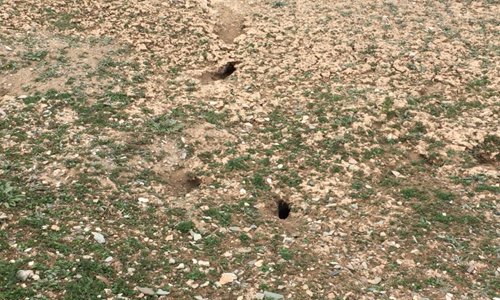
Photo: The density of rodent holes is much higher near the base area. (Photo via People's Daily app)
Cuojiduojie, 35, lives in poverty in Guoyang village in Maduo township. Other than around a dozen livestock for the six-member family, he has no other source of income. Last year, he worked in the plantation base loading and unloading, and earned nearly 20,000 yuan (about $2,850) in three months, a significant income.
At the same time, he learned to drive a tractor at the base. He said he plans to buy his own tractor to till the land next year. "Now I can work at my own home, and this won't affect my daily grazing work. But also when I return home at night, I can also continue my pastoral work," he said.
Cuojiduojie is not the only one. In 2018, Zhengbaicao recruited more than 30 herdsmen in Maduo township. Like him, herdsmen come to the base to work after releasing cattle and sheep in the daytime. In the evening, they drive cattle and sheep back to their enclosures. During the past year, the minimum income of herdsmen from the base was 7,000 yuan ($995) and the maximum income was 30,000 yuan ($4,266).
Sun Jianfei, chairman of Zhengletang Biotechnology Group, said the base only hires local herdsmen for the labor work, because people from other places would struggle with altitude stress. "In the future, we plan to set up a primary processing plant," he said."Hopefully this can add some value to the herbs and achieve self-hematopoietic capacity."
For a township like Maduo, where residents have always depended on nature to raise livestock, this is the first time for them to work at an enterprise at their doorstep. This is exactly what Zhengbaicai wants to achieve, hoping that the herbal plantations would make the local herdsmen stay.
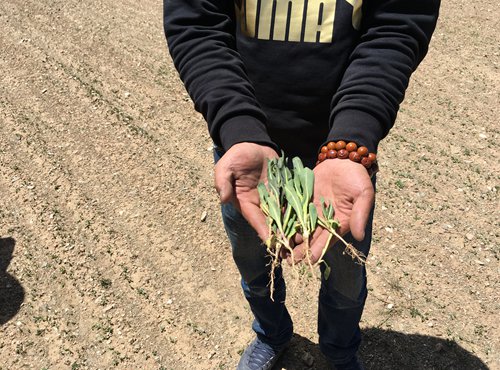
Photo: Harvested isatis roots are demonstrated. (Photo via People's Daily app)
With the alignment of ecological, social and economic effects, Sun said the plantation base will be expanded to 6,667 hectares in the next phase, and will gradually expand to 66,667 hectares, making it one of the largest Chinese herbal planting bases in China.